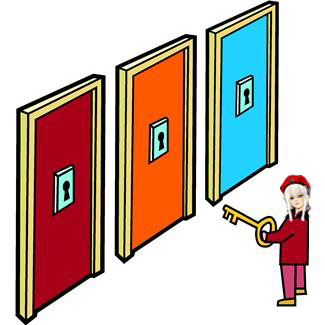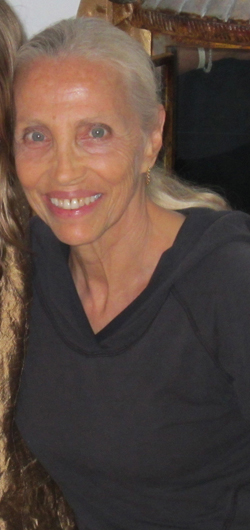MAKING A NEW DECISION, DECIDING NOT TO DECIDE OR DECIDING FOR ONE HOUR ONLY (Issue 1)
by Diane Gold
Warriors of Weight offers some insights on making a new decision, deciding whether to decide and realizing that most of our decisions are not forever. Most of us don’t realize that once we make a decision, we can re-negotiate that decision. Changing our decision does not mean failure to succeed. It means change for success. Often, the revelation that we are free to re-decide gives us enough freedom to proceed with no fear.
It came to me about a month ago, this simple and wonderful lesson on decisions, when I was speaking with my good friend, Glenn Livingston, a psychologist and marketer, with a compassionate and practical mind. So what does this have to do with decisions and Warriors of Weight? All day, we make decisions, some big, some small, that shape our path and that of our loved ones who are affected by them. Here’s what happened to me.
I was working on a project that needed a direction. Do I cross bridge A or take Bridge B? Glenn verbalized the brilliant idea that I should decide not to decide yet. Although I had been weighing the pros and cons of each of two courses of action, Glenn’s idea hadn’t occurred to me out loud. It was just what I needed to hear. Out loud. So, I went for it. In announcing to myself my choice not to decide, I saw the pressure I had created in thinking I had to decide. The pressure evaporated. I felt the freedom that comes from affirming a decision, in this case, deciding not to decide.
This determination led me to relax my thinking and my feelings on the issue. It also cleared my processing machine so that my decisions were based upon strategy, not pressure. Not too long after my proclamation of deciding not to decide, (an action, not an indecision), I came up with a simple new direction which, I knew, could be changed. I made the decision for one hour only, saying that, after that hour, I would weigh my decision. If it still made sense, I would keep it. If not, I would make a new one. As is usual, it took about 48 hours for me to remember to re-consider my decision. As it happened, my project started to morph, so my decisions morphed with it. But, I was able to get smoothly to that point by deciding not to decide and deciding for one hour at a time.

Here’s a simple example of deciding not to decide in action. In choosing an email address that woul
d express the flavor of this site targeted at weight, moms and healt
hy daughters; I came up with the customer support email address of 1 [at] warriorsofweight [dot] com, which seemed the simplest and expressed the idea that readers, moms, daughters and experts, alike, would be one community. The second thought I had was how very important it is to have inner peace to be healthy and happy. This concept is paramount in dealing when moms dealing with their daughters on health issues. It seemed as though peaceIN [at] warriorsofweight [dot] com expressed the flavor of the site also. So, which one should I choose?
The integral community as one OR the inner peace that we must have in order to walk the straightest path to our goals? I had to choose one. OR, I decided not to decide.Rejoicing in the freedom of having made a decision not to make a decision, Warriors Of Weight will have two email addresses, based on your personality: the first, 1 [at] warriorsofweight [dot] com and, the second, peaceIN [at] warriorsofweight [dot] com. And here’s the great news. I can change this decision at any time. And that would be all right. It is one of the gifts we often have in our lives.
Let’s talk about deciding for an hour. What is the significance of this? Let’s say I want to help my daughter to achieve one of her goals, but she has told me she is sensitive about the subject and that she wants to handle it without my input and achieve her objective in her own way. So, in deference to her feelings, because I want to help her, have no need to prove that mom knows best; I will decide not to engage myself in the topic: for one hour only. At the end of this hour, if the topic is still at the forefront of my thoughts, I will re-evaluate my decision. I can:
- Maintain my decision to honor my daughter’s wishes and allow her to proceed on her own, which will grow my relationship with my daughter because I will be considering her wishes and her feelings; and it will allow her to face the consequences of her actions on her own which will help her to grow into a good decision maker.
- Approach my daughter gently and tell her I am available for that issue and check to see that she would still like to pursue her goal without my interference or help, however she perceives it.
- Change my decision and walk into her issue because I am the mom, I have the right, I have been through circumstances like it or I must show her the way. This could weaken the relationship with my daughter, would force her to follow my wishes, could show her my ability to help, could weaken her skills in independent action, and might cause her to close me out.

The way decision making usually works is that, once we have made a decision, we settle into it. We are relieved that we have made it, and we have a party that we no longer have to make it. Usually, we will not have the urge to renegotiate the decision in one hour. So, it might be a day or two or a week before we even think about it again.
The one hour interval is an arbitrary time slot that helps us with our original decision. Rather than thinking our decision is made for life, such as I will never eat popcorn again or I will never help my daughter again, we realize we can change our decision in as little as 60 minutes, and this makes our decision easier to make. After all, what’s an hour?
We can always write a journal article for an hour until it is time for us to examine our decision. And, in an hour, we may decide not to change our decision or forget completely we were letting an hour pass.
Since we spend more time with ourselves than with anyone else, we know lots about ourselves. We use whatever we can to make the most sensible decisions. Sometimes, there is a rush. But, often times, in working on relationships, in working on ourselves, we have time to wait before a final countdown occurs. At least an hour. So stepping out into a new decision becomes easier if we remember we can change it back in an hour.
Decisions can be fun. Knowing we can change them back keeps us pliable, loose and stress free. The one-hour decision concept might just give us the power we need to motivate ourselves up the ramp and out of the rut we have stepped in so that we can excel through our own actions. We have inner strength which decision making uses. Long live the ability to decide for just an one-hour.
Try this experiment: next time you are thirsty for a drink other than water, forfeit the drink, and go drink a glass of water. Resolve that you will wait on having your drink of choice for one hour. See how you feel in 60 minutes. The urge will probably have changed. You many not remember about it, and don’t set your alarm. The idea is to notice how inconsequential the original urge becomes. And you have controlled your destiny rather than your urges controlling it.
Now that we have spoke about decisions and a small experiment, why not share any insights. OK, you can wait an hour and see how you feel. Do the experiment, and share the results. Do you have any other stories to share about a decision that you made for a minute or an hour, one where you made a discovery, employed a strategy or all-out changed your life- path? We would like to hear about you by email to: 1 [at] warriorsofweight [dot] com, peaceIN [at] warriorsofweight [dot] com or through our online form at: http://warriorsofweight.com/contact-us/.
Diane Gold, Founder of Warriors of Weight, site for Moms For Healthy Daughters, is a mentor in tai chi, kung fu and meditation, a music pro and stress expert. She is also writing a book called Urges. She says, “As we understand that decisions can be changed, we develop an ease and a confidence in making them.”
 We are so pleased to offer you our experts in the fields of weight loss, exercise, nutrition, psychology, self-esteem, alternative methods, fashion and meditation. It is your red carpet day.
We are so pleased to offer you our experts in the fields of weight loss, exercise, nutrition, psychology, self-esteem, alternative methods, fashion and meditation. It is your red carpet day.




 AT PEACE WITH DIANE GOLD, WHERE DIANE GOLD INTERVIEWS
AT PEACE WITH DIANE GOLD, WHERE DIANE GOLD INTERVIEWS 






